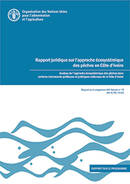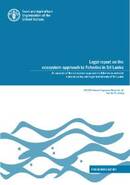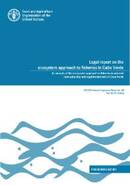EAF-Nansen Programme reports

Legislating for an ecosystem approach to fisheries (EAF) is complex, due to the holistic nature of EAF involving multiple factors that underpin the social, economic, environmental, and institutional aspects of fisheries sustainability. These factors include ecosystems integration, risks, inter-sectoral collaboration, research, participatory processes, monitoring, control, surveillance, and enforcement, among others. To assess how an EAF is being implemented through national policy and legal frameworks, FAO developed A diagnostic tool for implementing an ecosystem approach to fisheries through national policy and legal frameworks.
The present legal report on the EAF used the diagnostic tool to assess the alignment of selected policy and legal instruments of Sao Tome and Principe with the EAF. This assessment analysed the extent to which 82 EAF legal requirements, considered to be the minimum requirements to be included in legislative activity for an EAF, are reflected in Sao Tome and Principe's policies and legislation relevant to the country's fisheries sector and other relevant sectors (such as environment, wildlife, ecosystems, and maritime affairs). Based on this preliminary diagnosis, gaps were identified in the assessed instruments, and recommendations were formulated with a view to improving the implementation of the EAF.
This report was prepared following a participatory approach, involving the relevant national authorities of Sao Tome and Principe. Prepared in early May 2023, the report was presented to the national authorities of Sao Tome and Principe in a face-to-face meeting in Sao Tome later that month. The Minister of Agriculture, Rural Development and Fisheries approved this EAF Legal Report of Sao Tome and Principe in June 2023.

Légiférer en conformité avec l’approche écosystémique des pêches (AEP) est une tâche complexe, compte tenu de la nature holistique de l'AEP, qui implique une multitude de facteurs étayés par les aspects sociaux, économiques, environnementaux et institutionnels ayant un impact sur la durabilité de la pêche. Pour évaluer la manière dont l'AEP est appliquée dans les cadres politiques et juridiques nationaux, la FAO a élaboré le document intitulé «Un outil de diagnostic pour la mise en œuvre d'une approche écosystémique des pêches à partir des cadres politiques et juridiques». Le présent rapport juridique sur l'AEP a eu recours à cet outil de diagnostic pour évaluer la conformité de certains instruments politiques et juridiques de la Côte d'Ivoire avec l'AEP. Cette évaluation a analysé dans quelle mesure les 82 exigences juridiques de l'AEP, jugées comme les normes minimales pour légiférer selon l'AEP, sont prises en compte dans les instruments politiques et juridiques ivoiriens relatifs au secteur de la pêche et autres secteurs pertinents (comme l'environnement, la faune, les écosystèmes et les affaires maritimes). À partir de ce diagnostic préliminaire, des lacunes ont été identifiées dans les instruments évalués et des recommandations ont été formulées en vue d'améliorer la mise en œuvre de l’AEP.

Legislating for an ecosystem approach to fisheries (EAF) is complex, due to the holistic nature of EAF involving multiple factors that underpin the social, economic, environmental, and institutional aspects of fisheries sustainability. These factors include ecosystems integration, risks, intersectoral collaboration, research, participatory processes, monitoring, control, surveillance, and enforcement, among others. To assess how an EAF is being implemented through national policy and legal frameworks, FAO developed a diagnostic tool for implementing an ecosystem approach to fisheries through national policy and legal frameworks.
The present legal report on the EAF used the diagnostic tool to assess the alignment of selected policy and legal instruments of Sri Lanka with an EAF. This assessment analysed the extent to which 82 EAF legal requirements, which are considered the minimum standards in legislating for an EAF, are reflected in Sri Lanka's policies and legislation relevant to the fisheries sector of the country and other relevant sectors (such as environment, wildlife, ecosystems, and maritime affairs). Based on this preliminary diagnosis, gaps were identified in the assessed instruments, and recommendations were made for improving the implementation of an EAF.
This report was elaborated following a participatory approach with the involvement of the national competent authorities of Sri Lanka. Drafted in July 2021, the report was submitted to the national authorities of Sri Lanka in October 2021, and revised in October 2022. The National Aquatic Resources Research and Development Agency (NARA) and the Department of Fisheries and Aquatic Resources (DFAR) endorsed this EAF Legal Report in January 2023.

Legislating for the ecosystem approach to fisheries (EAF) is complex, due to the holistic nature of the EAF involving multiple factors that underpin the social, economic, environmental, and institutional aspects of fisheries sustainability. These factors include ecosystems integration, risks, intersectoral collaboration, research, participatory processes, monitoring, control, surveillance, and enforcement, among others. To assess how the EAF is being implemented through national policy and legal frameworks, FAO developed A diagnostic tool for implementing an ecosystem approach to fisheries through national policy and legal frameworks.
The present legal report on the EAF used the diagnostic tool to assess the alignment of selected policy and legal instruments of Sierra Leone with the EAF. This assessment analysed the extent to which 82 EAF legal requirements, which are considered the minimum standards in legislating for the EAF, are reflected in Sierra Leone's policies and legislation relevant to the fisheries sector of the country and other relevant sectors (such as environment, wildlife, ecosystems, and maritime affairs). Based on this preliminary diagnosis, gaps were identified in the assessed instruments, and recommendations were made for improving the implementation of the EAF.
This report was elaborated following a participatory approach with the involvement of the national competent authorities of Sierra Leone. Drafted in July 2021, the report was submitted to the national authorities of Sierra Leone in October 2021, and further revised and resubmitted in November 2022. The Ministry of Fisheries and Marine Resources of Sierra Leone revised and endorsed this EAF Legal Report in February 2023.

Legislating for the ecosystem approach to fisheries (EAF) is complex, due to the holistic nature of the EAF involving multiple factors that underpin the social, economic, environmental, and institutional aspects of fisheries sustainability. These factors include ecosystems integration, risks, intersectoral collaboration, research, participatory processes, monitoring, control, surveillance, and enforcement, among others. To assess how the EAF is being implemented through national policy and legal frameworks, FAO developed A diagnostic tool for implementing an ecosystem approach to fisheries through national policy and legal frameworks.
The present legal report on the EAF used the diagnostic tool to assess the alignment of selected policy and legal instruments of Cabo Verde with the EAF. This assessment analysed the extent to which 82 EAF legal requirements, which are considered the minimum standards in legislating for the EAF, are reflected in Cabo Verde's policies and legislation relevant to the fisheries sector of the country and other relevant sectors (such as environment, wildlife, ecosystems, and maritime affairs). Based on this preliminary diagnosis, gaps were identified in the assessed instruments, and recommendations were made for improving the implementation of the EAF.
This report was elaborated following a participatory approach with the involvement of the national competent authorities of Cabo Verde. Drafted in July 2021, the report was submitted to the national authorities of Cabo Verde in October 2021, further revised in view of the adoption of additional relevant legal instruments by Cabo Verde and the integration of the conclusions and recommendations from the Coastal Fisheries Initiative Report from August 2022. The report was re-submitted to the national authorities in October 2022. The National Directorate of Fisheries and Aquaculture, under the Ministry of the Sea, endorsed this EAF Legal Report of Cabo Verde in October 2022.
